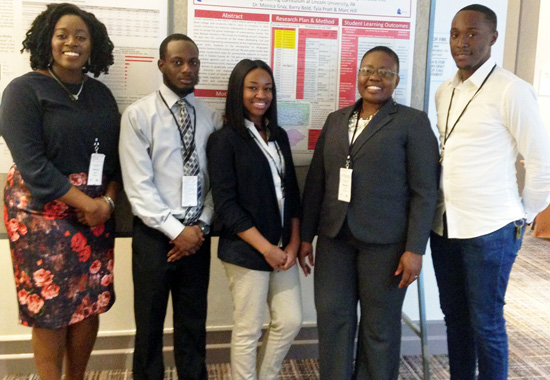- Posted in All University
- Category: Campus News
LINCOLN UNIVERSITY, Pa. – A group of Lincoln University engineering science students and their professor participated in the U.S. Environmental Protection Agency’s 2016 National Toxics Release Inventory conference as part of the agency’s university challenge program October 19-21 in Washington, D.C.
The university, which was selected as an academic partner as a result of Assistant Professor of Civil and Environmental Engineering Monica Gray’s successful proposal, will also be engaged in other challenge program-related activities. They include an EPA site field trip and attendance at a staff lecture. In addition, students will also develop posters and make stakeholder presentations at various local and regional conferences such as the Regional Undergraduate Student Research Conference and the Greater Philadelphia Louis Stokes Alliance for Minority Participation Undergraduate Research Symposium.

Lincoln University’s EPA liaison for the TRI University Challenge Lauren Davis, left, poses with student Barry Bold, student Tyia Pratt, professor Monica Gray, and student Marc Hill on October 20, 2016 in Washington, D.C.
“As an institution, we recognize the synergistic effect of experiential education on recruiting and retaining minority students in STEM fields,” Gray said. “Lincoln University is therefore excited to partner with the EPA to expose our students to TRI data, tools, and analysis as well as connect them to professionals in their chosen field.”
The TRI University Challenge aims to increase awareness of the TRI Program and data within academic communities; expose students to TRI data, tools, and analysis; and generate innovative programs, activities, recommendations, or research that improve the accessibility, awareness, and use of TRI data, according to an agency press release. The EPA is looking to academic institutions to help build a diverse portfolio of practical and replicable projects that benefit communities, the environment, academic institutions, and the TRI Program.
The TRI Program provides information to the public on disposal and other releases of over 650 toxic chemicals from more than 20,000 U.S. industrial facilities.
Gray, who has been charged with expanding the civil and environmental engineering concentration under Lincoln’s engineering science program, added that the University’s program will rely on TRI data as well as that of other environmental health-related data in the upper level civil and environmental engineering curriculum as well as in the introduction of geographic information systems and two senior design capstone courses.
###
By Eric Christopher Webb ’91, Director, Office of Communications & Public Relations